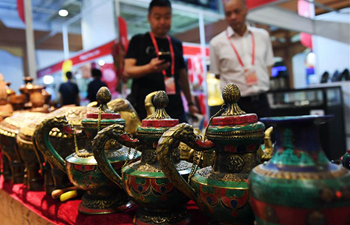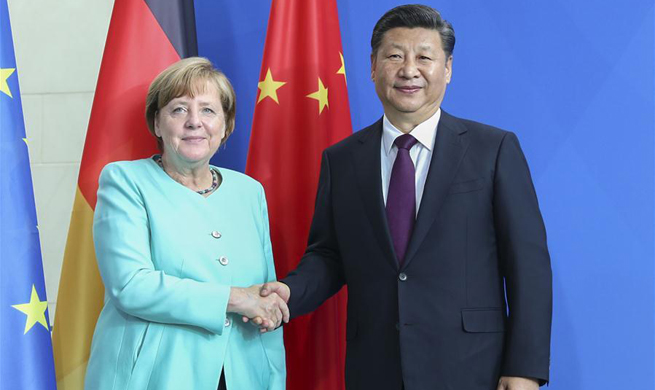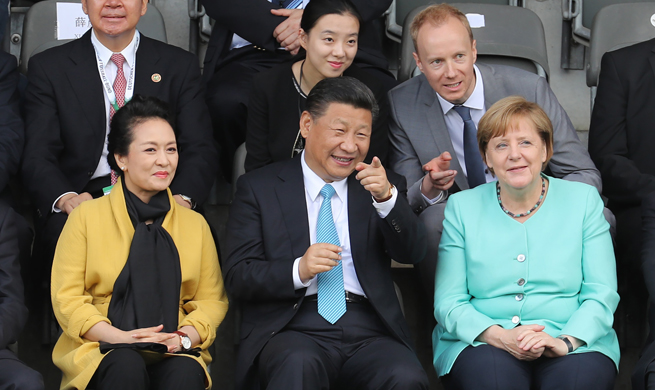BEIJING, July 6 (Xinhua) -- Qin Fang has already smashed two smart phones since her 14-year-old daughter became obsessed with the mobile game "Honor of Kings."
When she saw her daughter direct her attention towards the laptop, she was almost ready to give up hope. However, the game's producer, tech company Tencent, Tuesday enforced a regulation to limit the amount of time children can spend playing the game.
Honor of Kings is currently the most popular mobile game in China, with more than 200 million registered players, or one in seven Chinese. Tencent statistics showed that close to half of the players are under 20 years old.
With many parents complaining that their children have become addicted to the game, Tencent started limiting the playing time for children and teenagers. Those under 12 can play for a maximum of an hour a day and cannot play after 9 p.m., while those aged from 12 to 18 can play no more than two hours a day.
A CURE OR NOT
Qin's daughter Xiao Yun (pseudonym) usually plays the game until the early hours of morning, and her mother said it has affected her studies.
"She was the top student in her class," Qin said. "But now she's ranked 19th and her teachers complain that she falls asleep at school."
Xiao Yun has also become ill-tempered, and gets angry easily if she is disrupted while playing the game.
She is not alone. In a recent extreme example in south China's Guangdong Province, a 17-year-old boy suffered a stroke after playing the game continuously for 40 hours.
According to Tencent's new regulation, Xiao Yun will only be able to play for two hours a day, which has made her mother very happy.
Tencent has required players to register their real name and ID number, which give it access to their date of birth.
However, many people question the effectiveness of the move.
Wang Yiming, a fifth-grader in Nanchang, capital of east China's Jiangxi Province, was able to buy an account name online after his parents stopped him from playing the game.
"You only need to provide your phone number, QQ messaging service ID and email address," he said. "No one asks if you are underage or not."
A Beijing News reporter bought an account name for 140 yuan. He quoted the person who sold it to him as saying "many of the buyers are primary or middle school students."
The regulation has also increased business for tech people, like Xiao Jie (pseudonym), who can change the ID information so that teenagers and children can pretend to be adults and play as long as they like. Xiao Jie said he doubled his fee to 20 yuan on Tuesday.
BEHIND THE ADDICTION
Since it was launched, Honor of Kings has been criticised for many reasons, one of which is that it misrepresents history.
Players can choose from dozens of characters such as sorcerers, warriors, assassins or archers and then team up with friends. The characters include both Chinese and foreign historical figures like Genghis Khan and King Arthur, legendary heros like Athena and the Monkey King, as well as Japanese anime characters.
However, in the game Jing Ke, an assassin who attempted to kill China's first emperor Qin Shi Huang, has been portrayed as a sexy woman, causing students to express bewilderment when they find out the assassin's true identity in history class.
Honor of Kings is just one of the smartphone games currently gaining popularity in China.
The smartphone game revenues of Tencent and NetEase, China's gaming giants, reached 12.9 billion yuan and 7.868 billion yuan respectively in the first quarter, up 20.6 percent and 36.4 percent from previous quarter.
"In the past three years, more people have started using smartphones. Mobile games have become a form of entertainment for many," said Zhong Hong, vice president of Guangzhou Baitian Information Technology.
"If people have a smart device, they will generally install at least one game. Very few young people don't play games," Zhong said.
In addition to its entertainment value, a player named Huang Luo thinks people have become more addicted to smartphone games because "they are more than just a game."
"Smartphone games serve as a means of socialization. If you don't contact your friends or classmates for a long time, you can jump online and play games with them and the friendship returns," Huang said.
Huang's view is echoed by Zheng Zizhen, researcher with Guangdong Provincial Academy of Social Sciences.
"Today's teenagers lack friends to play with. Online games can satisfy their need for communication and give them a sense of belonging," Zheng said.
"Online games don't require playgrounds or arranging to meet up in advance. You can play anytime, anywhere. It fits the modern lifestyle," Zheng added.
MORE THAN REGULATION
Zhong Hong believes that people shouldn't be afraid of smartphone games, which, if properly used, could be a tool to help improve children's creativity and social ability.
"On the other hand, parents need to communicate with their children and have a good relationship, so that they don't need to seek comfort from games," Zhong said.
"Parents should try to understand the reasons why their children become addicted to games," said Liu Zhaoying, a psychology professor with the Beijing Normal University. "Do they need more friends or are they just looking for a way to entertain themselves? Lecturing and scolding will just make things worse."
This view was shared by Xiang Ligang, board chairman of the Information Consumers' Federation.
"Schools should help students understand the harm of mobile phone game addiction, while the government should implement a grading system for games," he said.
Qin has begun reflecting on her own behavior. "I'm not patient enough and sometimes I'm too hard on her," she said.
She plans to take Xiao Yun to a four-day holiday this weekend in a bid to improve their relationship.

















